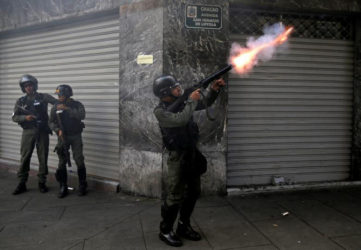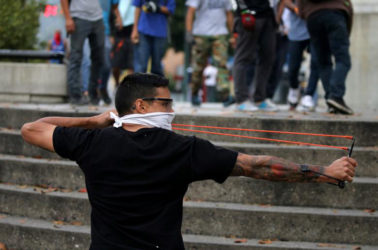CARACAS (Reuters) – Venezuelan opposition supporters took to the streets again yesterday in sometimes violent clashes to protest an economic crisis and an erosion of democracy under leftist President Nicolas Maduro, in the first sustained wave of anti-government demonstrations in three years.
A Supreme Court decision in late March to assume the functions of the opposition-led congress sparked outcry among a population already suffering from triple-digit inflation and widespread shortages of basic goods.
The court quickly overturned the most controversial part of its decision but the move triggered condemnation at home and abroad, as did Friday’s news that the national comptroller had banned politician Henrique Capriles – seen as the opposition’s best hope in a presidential election scheduled for next year – from office for 15 years.
Demonstrators gathered in several cities yesterday for a fourth round of protests in 10 days, blocking the main highway through Caracas in the morning until they were dispersed by National Guard troops.

Opposition leaders slammed the government for arbitrary use of force in breaking up yesterday’s demonstrations. They pointed to tear gas being fired into one Caracas clinic, requiring a baby to be rushed out by medical technicians.
“Not even in war are there are attacks on hospitals and health centres,” said opposition legislator Jose Manuel Olivares in a news conference.
Government officials sent images and videos via Twitter of hooded and masked protestors destroying public property such as a bus stop, accusing the opposition of orchestrating violence to destabilize the government.

Interior Minister Nestor Reverol said 18 people had been detained during the protests, which coincided with the usually vacation-focused Easter week holiday.
“These extremist sectors promote violent acts during the days that our people celebrate Holy Week, thus taking on the role of anti-Christ,” Reverol said in a televised statement.
Small groups in various of parts of Caracas maintained sporadic clashes with troops throughout the afternoon and into the evening, in some places setting up barricades of tyres and burning trash along thoroughfares.
Brazilian Foreign Minister Aloysio Nunes and Organization of American States chief Luis Almagro called on Venezuela yesterday to restore full democracy and set a timeline for elections, increasing diplomatic pressure on Maduro.
The State Department yesterday issued a statement expressing “grave concern” over Friday’s decision to disqualify Capriles from holding office.
The opposition is demanding a date for gubernatorial elections that were supposed to take place last year, as well as a timeline for future elections including the presidential vote, which is constitutionally mandated for 2018.
Despite the surge in protests, many Venezue-lans are pessimistic that marches can bring about change, scared of violent clashes, or simply too busy trying to find food.
Maduro’s unpopular government accuses the opposition of fomenting violence to lay the ground for a foreign invasion.
Some 188 protesters, most of them students, were arrested in the period April 4-8 and 57 are still behind bars, rights group Penal Forum said yesterday.
Nine people, including two teenagers, were arrested for breaking into an office of the Supreme Court and vandalizing it at the end of Saturday’s march. And a 19-year-old was shot dead in violence around protests on Thursday.
The government has come under increased pressure from American and European countries that have condemned violence in Venezuela and the ban on Capriles.
Maduro, a former bus driver and union leader who accuses foreign countries of “meddling,” travelled to communist ally Cuba on Sunday for a meeting of the ALBA bloc, which includes Venezuela’s leftist allies in Latin America including Nicaragua, Bolivia and Cuba.









